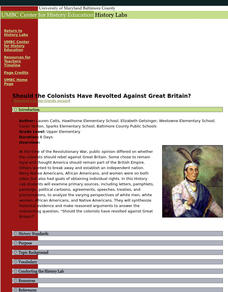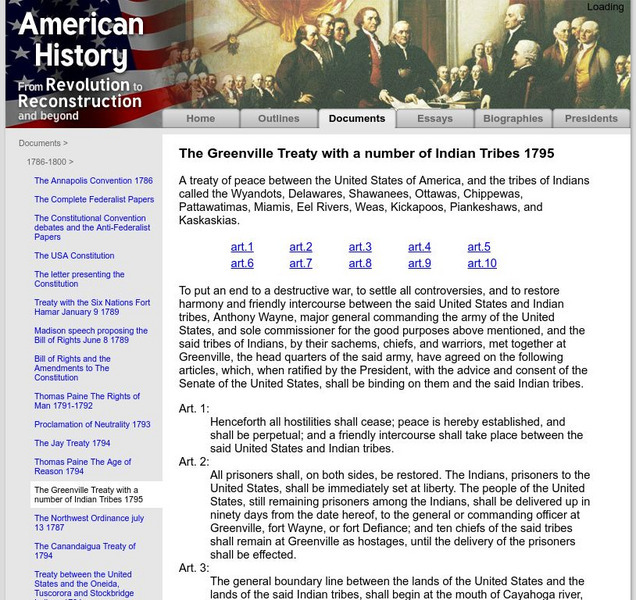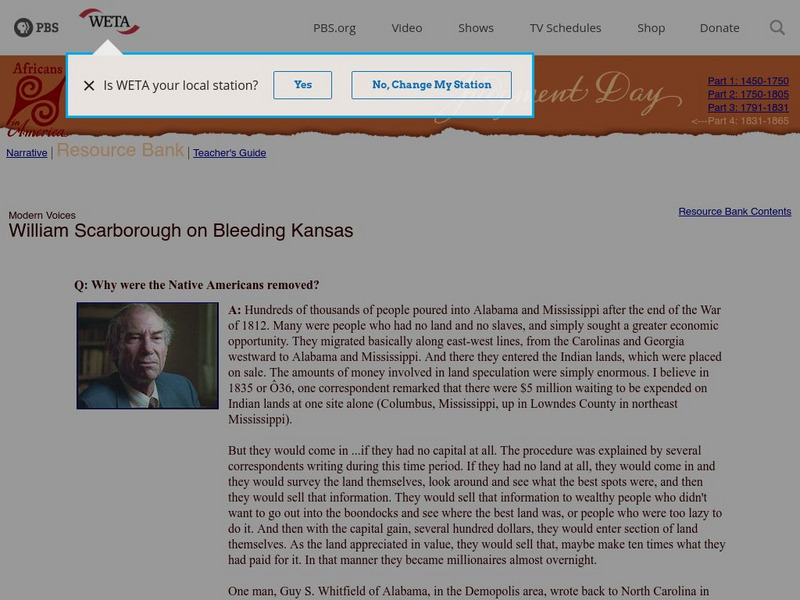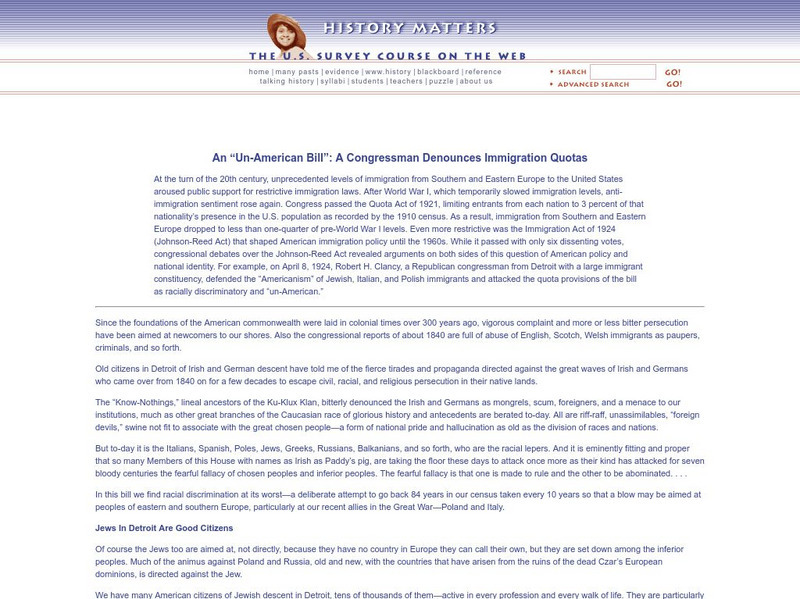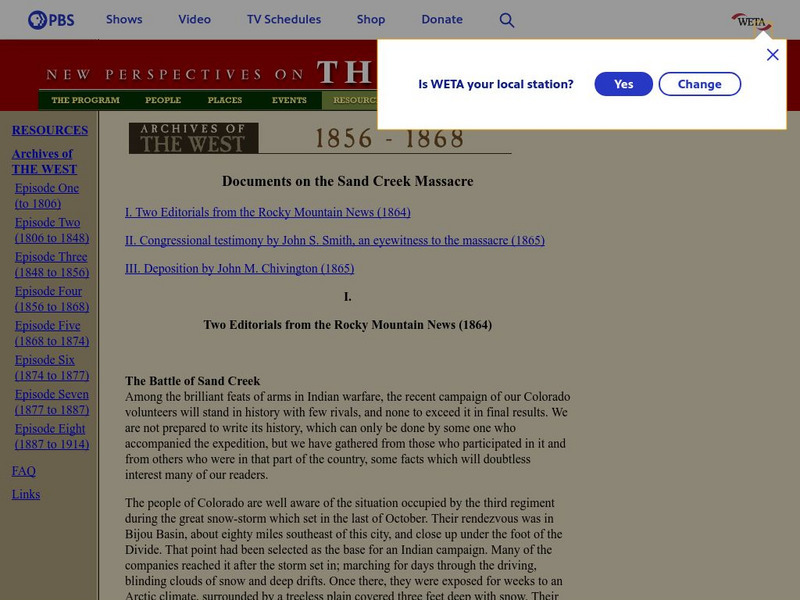Center for History Education
Should the Colonists Have Revolted Against Great Britain?
Should the Americans have taken the plunge and revolted against Great Britain? Using documents, including the famed Common Sense and a Loyalist response, pupils conduct a lengthy investigation of the question. The interesting resource...
University of Groningen
American History: Documents: The Greenville Treaty
Read the full text of The Greenville Treaty, a treaty of peace and friendship between the United States and a coalition of Native American tribes.
PBS
Pbs: Aia: William Scarborough: Why Were the Native Americans Removed?
A discussion by Dr. William Scarborough about the migration into Alabama and Mississippi after the War of 1812. Whites not only displaced the Indians, but also eventually brought in thousands of slaves.
Texas State Library and Archives Commission
Texas State Library and Archives Commission: Native American Relations in Texas: Sam Houston to Edmund P Gaines Aug 1836
Read this letter by Sam Houston through which he "asks for American help in preventing uprising in Nacogdoches, 1836." This site includes images of the original letter, as well as line-by-line transcription of the handwritten text.
Smithsonian Institution
Smithsonian: National Museum of the American Indian: Battle of Little Bighorn
The Battle of Little Bighorn made an immense impression on American society and culture. Americans became obsessed with this battle and created artworks, shows, postcards, and dime novels. View primary sources from this era to understand...
University of Oklahoma
University of Oklahoma College of Law: The Treaty of Greenville
Contains the full text of the Treaty of Greenville which was a treaty of peace and friendship between the United States of America and the tribes of Native Americans called the Wyandots, Delawares, Shawanees, Senacas, Miamies, Ottawas,...
Digital Public Library of America
Dpla: The War of 1812
With the sources in this set, together with prior knowledge, students can fill in the timeline of this crucial war and begin to answer the question, "Why do we care about the War of 1812?"
Curated OER
History Matters: Get the Rope! Anti German Violence in World War I Era Wisconsin
Read this harrowing account of a German-American farmer whose nativist neighbors suspected his alliegiance to the United States after the country entered the war against Germany in World War I.
Curated OER
History Matters: An Un American Bill: A Congressman Denounces Immigration Quotas
The rise of anti-immigration feeling after World War I resulted in legislation limiting the number of immigrants from various areas of of the world. Read the speech by a Congressman decrying the immigration quotas by giving examples of...
Arizona State University
Jaie: Vice President Pledges Aid
This site from Journal of American Indian Education provides a speech by vice-president Hubert Humphrey, the benefits of the War on Poverty for Native Americans are described.
Oklahoma State University
Oklahoma Historical Society: W. Pollock: Pawnee Indian and Artist [Pdf]
A short account featuring the life of a Pawnee Native American who adapted to the ways of the Americans and later served in Roosevelt's Rough Riders.
US National Archives
Nara: Teaching With Documents: Memorandum Regarding Enlistment of Navajo Indians
A fascinating description of the background behind the recruitment of Navajo speakers as code talkers in World War II. Included is the document from General Clayton Vogel who recommended the development of the use of code talkers, and...
Library of Congress
Loc: Prints and Photographs Online Catalog
This online catalog offers thousands of primary source photographs and prints from around the world.
US National Archives
Our Documents: Treaty of Fort Laramie(1868)
Read and view a copy of the complete text of the treaty of Fort Laramie which recognized the Black Hills as part of the Sioux Reservation. Accompanying documentary explains how the treaty was broken as a result of the discovery of gold...
Curated OER
National Park Service: A Sharp Little Affair [Pdf]
Although somewhat difficult to read, this PDF file from the National Park Service describes the Battle of Big Hole and the history and archeology surrounding this battle site. A most extensive study.
Arizona State University
Jaie: Will We Meet the Challenge?
This site from Journal of American Indian Education provides the 1964 speech presented to the Governor's Interstate Indian Council describes reservation conditions and prospects, in light of the War on Poverty.
PBS
Pbs: Archives of the West: Selections From "With the Nez Perces"
Contains selections from "With the Nez Perces: Alice Fletcher in the Field, 1889-92" by E. Jane Gay, which provided an anthropological look at the Nez Perce Indians and their bewilderment at the Dawes Act.
PBS
The West: Documents on the Sand Creek Massacre
Contains the text of documents on the Sand Creek Massacre, including two editorials from the Rocky Mountain News, Congressional testimony by John S. Smith, and a deposition by John M. Chivington
National Humanities Center
National Humanities Center: Toolbox Library: Progress, the Gilded and the Gritty: America, 1870 1912
Eighteen primary sources-historical documents, literary texts, and visual images-that explore the industrial, racial, and technological progress of the late-nineteenth century.
PBS
Pbs the West: The Pursuit and Capture of Chief Joseph
Provides detailed information on the Nez Perce campaign and the capture of Chief Joseph in an eyewitness account by Charles Erskine Scott Wood, aide to General Howard.
PBS
Pbs the West: Gen. Nelson A. Miles on the "Sioux Outbreak"
Statements and reports forwarded up the chain of command in 1891 about the failure of the government to provide either food or other promised support to Sioux Indians after the destruction of buffalo herds.
